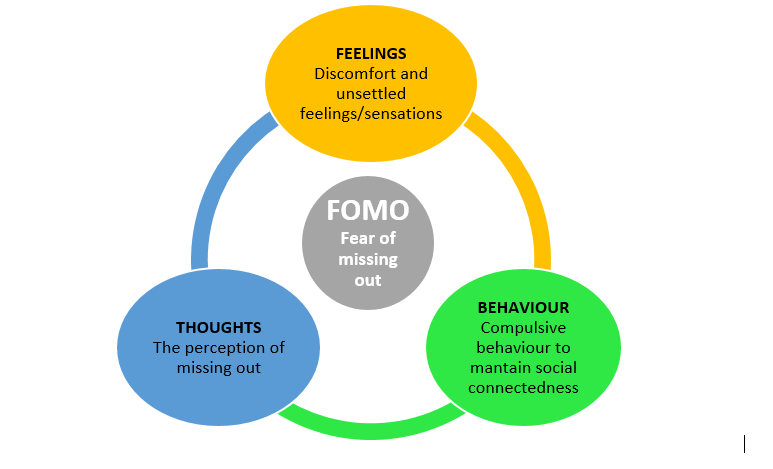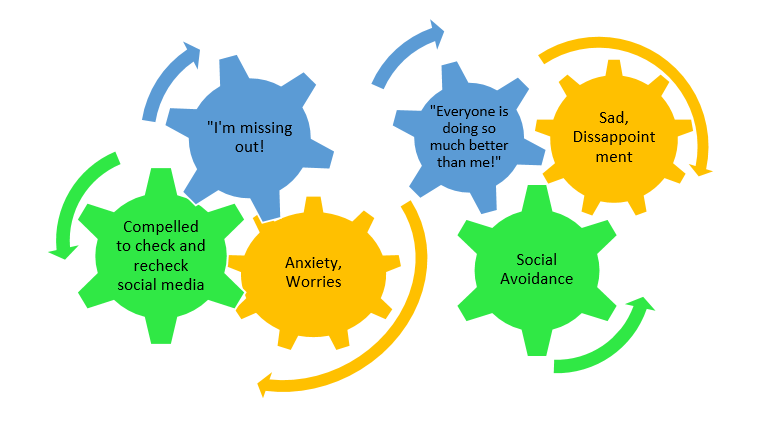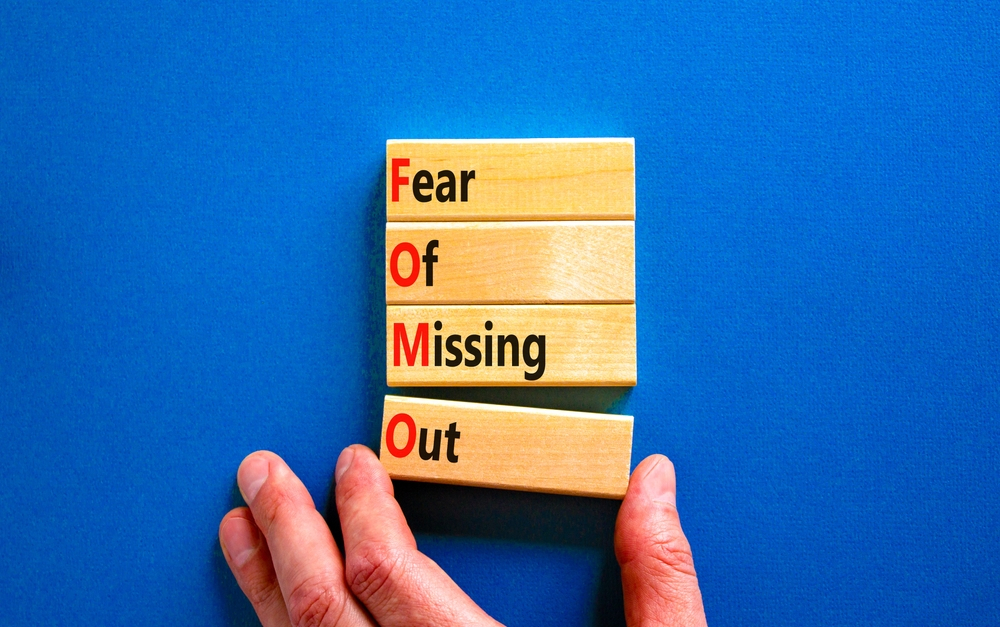Fear of Missing Out (FOMO): Understanding the psychology behind FOMO.
Social connectedness are the basics of human needs and provides an intrinsic motivation. This drive for social relatedness promotes positive wellbeing. Establishing and maintaining social connectedness is also considered a protective factor for good mental health. The positive social experiences contribute towards positive emotions and thoughts, not only of oneself, but also the people around them and their surroundings.
However, when these needs are unmet, it creates this feeling of apprehension and discomfort. In which, contribute towards one being compelled to stay connected. Thus, being part of the Fear of Missing Out phenomenon.
What is FOMO?
Fear of missing out. The term that has been dated as early as in the 2000’s and have become a widely common lexicon in daily conversations. Fear of missing out or easily abbreviated as FOMO, is defined as “a pervasive apprehension that others might be having rewarding experiences from which one is absent” (Przybylski et al., 2013, p. 1841). It basically means that it involves feelings of concerns, worries and anxieties that people may be experiencing when they feel that they have missed out from exciting and satisfying experiences that have taken place in their extended social circles.
Unfortunately, these extended social circles have also become wide and even borderless with the existence of social media and the breadth of the social coverage. The use of social technology has further created an easy platform to fulfil the desire “to stay continually connected with what others are doing” (Przybylski, Murayama, DeHaan, & Gladwell, 2013, p. 1841). Social media provides the platform to feed and satisfy these needs to be up to date. However, it also contributes towards a sense of compulsion to be connected in which contribute easily for one to experience a sense of FOMO in this day of age.
How does FOMO look like?
- Constantly needing to know what is in trend
- Over engrossed on your phone
- Constantly checking social media updates
- People pleaser – agreeing to every request and invitation
- Overbooking and having a hectic schedule
- Not sticking to commitments made and having less satisfaction on those committed
- Immersed in documenting or capturing everything being done and more interested in what others might say about them
- Fatigue and neglecting your own health – poor sleep, unhealthy diet, poor hygiene
- Easily distractible and reduced focus
- Increased anxiety and depressive symptoms when seeing others having fun
- Constantly desiring to be more out there
- Constantly comparing your experience and/or life with others
- Feeling lethargic and unmotivated
The psychology of Fear of Missing Out
The processes that involve FOMO can be broken down into the interaction of thoughts, feelings and behaviour and how each of these components are interconnected. One component affects the other, in which can lead into an unhelpful negative spiral of emotions and maladaptive behaviours.


One can start having thoughts and perception that they are missing out.
Thoughts: “I am missing out”, “What if they have more fun and I am not there and do not know what happened?”, “What if they get to do those exciting things and I did not?”, “What if they say something bad about me for missing out on the event?”, “What if I am considered less because I miss out on the trend?”.
These thoughts are what psychologists call the “What if’s”. These are common unhelpful thoughts that propels the feeling of anxiety, nervous and worry.
Feelings: Anxiety, Nervous, Worry
These are thoughts that makes one have uncomfortable feelings and sensations. Thus, to avoid experiencing such discomfort, one feels compelled to engage in behaviours that ensures they are continuously remain updated.
Behaviour: Compulsive behaviours to check and recheck social media so to appear “always in the know”, being a “people pleaser” to appear “cool” or behaving out of character just to be “in trend”.
These cycle of anxious thoughts, feelings and behaviour further contribute towards a skewed perception of oneself (e.g., “I’m not good enough”) and perception of their social environment (e.g., “Everyone is doing better than me.”). This leads to feelings of sadness and disappointment contributing to maladaptive behaviours such as social avoidance, difficulties sleeping and poor functioning, ultimately resulting in feelings of low self-worth, helplessness, and depression.
Thoughts: “I’m not good enough”, “Everyone is doing better than me.”
Feelings: Disappointment, Depression
Behaviour: Crying, Social Avoidance, Poor sleep, Poor diet
Dealing with FOMO
FOMO is a negative psychological phenomenon and can have a significant impact not only on one’s mental health but also physical, social and occupational health. This sense of wanting to be socially connected can drive a person to be even more disconnected with what is important in their life. Thus, it is important to identify and notice if you do have these difficulties. Some ways to manage these difficulties include:
- Acknowledge the impact FOMO has on your life and functioning
- Making conscious effort and create value-driven actions to break the compulsive habit
- Get in more quality time – making real connections, focussing more on the quality of the connection and relationship within your social circle
- Doing what is important for you in your life
- Refocussing on improving sleep and diet
- Refocus towards doing physical activities as compared to focussing the energy on social media
- Practicing mindfulness and relaxation
For many, FOMO is not an experience that has been felt overnight. It may be a struggle that has been experienced for over a long period of time in which may have led to feelings of anxiety, depression, or obsessive-compulsive behaviours. This in which may have severely affected day-to-day functioning. Therapy would be a good option to help and support your struggles and provide healthier ways of coping. If you feel that you are experiencing depressive or anxiety symptoms or notice FOMO affecting your daily functioning, do reach out for help.
Psychotherapy provides a platform for you to work with a therapist that will help and support you to break this vicious cycle and create helpful habits towards a more meaningful life. Mindfulness has also been found to be helpful to manage the unhelpful thoughts that triggers the cycle of anxiety and depression.
FOMO if goes untreated can lead to more significant difficulties in one’s life. It is best to reach out and get the support and help needed.
Reference:
- Fioravanti, S. Casale, S. Benucci, A. Prostamo, A. Falone, V. Ricca, F. Rotella, Fear of missing out and social networking sites use and abuse: A meta-analysis, Computers in Human Behavior, Volume 122, 2021, 106839, ISSN 0747-5632, https://doi.org/10.1016/j.chb.2021.106839.
Andrew K. Przybylski, Kou Murayama, Cody R. DeHaan, Valerie Gladwell, Motivational, emotional, and behavioral correlates of fear of missing out, Computers in Human Behavior, Volume 29, Issue 4, 2013, Pages 1841-1848, ISSN 0747-5632, https://doi.org/10.1016/j.chb.2013.02.014.
Author
DR AIDA SUHAIMI
- Clinical Psychologist





